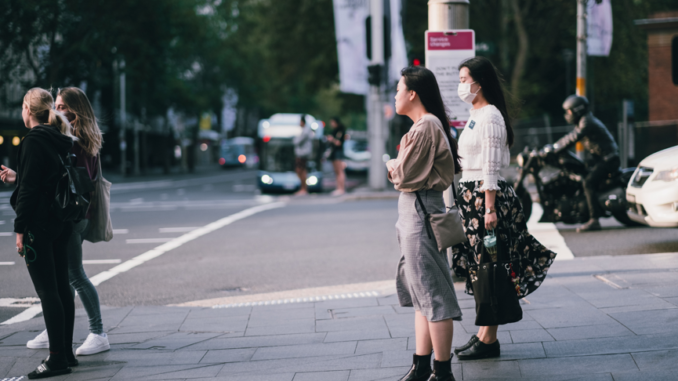
The moment when Mera realized herself being called “virus” on the street in Sydney, she was so shocked that her mind just went blank. It is the first time for her being racially discriminated, and fears soon came over her.
“He might hurt me,
“there was a hateful look in his eyes,” she said.
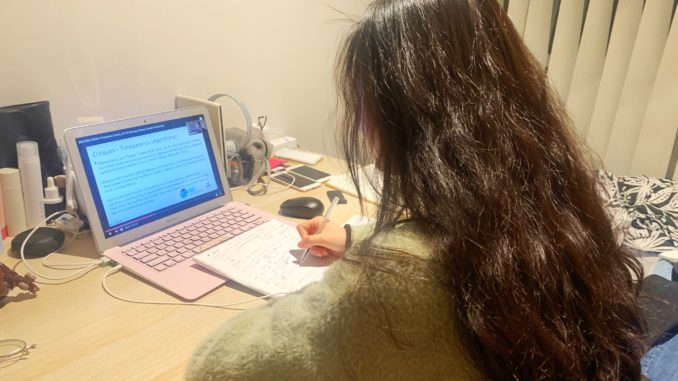
Mera Miao is an international student from China. A few weeks ago, she met the racist on her way back home from supermarket.
She was wearing a mask, chatting with her friend in Chinese through a phone. The male suddenly neared her and put on his mask.
“I only put on my mask when passing by the virus,” the man said, “go back to your country.”
Shocked and scared, Mera was frozen and couldn’t speak any words, watching him walking away. When he was finally out of sight, she felt relief for few seconds, and then, grievance crowded in on her.
She used to believe that Australia is a humanistic country with friendliness and open minds, until the worldwide breakout of Coronavirus provided a “reasonable” excuse for anti-Asian racism in Australia.
In the special period of Coronavirus-caused quarantine, an increasing hostility emerges towards Asians in Australia. What happened to Mera is not a single case.
Spreading anti-Asian attacks
Actually, the rate of racist offences towards Asian-Australians has been significantly increasing since the Coronavirus breakout.
If you paid attention to the Melbourne local news on April, you will find the Asian international students were assaulted and told to “get the f*** out of our country”. And an Asian-Australian bus driver was racially discriminated by passenger.
Even the home of an Asian family was spray painted “COVID-19 China die”, and their house windows were broken by stone.
Police Commissioner announced that recently 22 anti-Asian offences were committed in Queensland in weeks, including racial insults, robberies and physical attacks.
While medical professionals are combating the deadly #coronavirus world widely, news corp’s media practitioners only know how to stir things up in the society pic.twitter.com/9KlxchCzCr
— Shengyin Li (@ShengyinL) January 30, 2020
Yet, the actual number is underestimated.
The survey launched by Asian Australian Alliance reveals that only 5.6% Asian victims of Coronavirus-related racism reported their experiences. More victims, like Mera, choose to keep silent.
“Honestly, I’m afraid of being revenged by that (racist) man if I reported it to the police.
“And I was verbal discriminated, no more physical abuses, it seems too little to call a police,” she said.
“Coronavirus Anxiety” and “Sinophobia”
A research from Ipsos MORI suggests that 60% Australians consider at least a “high level” of the Coronavirus threat to the world. With this socially prevailing emotion, many Asians have suffered from the racism bred by so-called “Coronavirus Anxiety” online or offline, explicitly or implicitly.
The survey also shows that around 30% Australians tent to avoid having any contact with Asian looks, and stop buying Chinese foods or products made in China, due to the fear of getting infected.
But these actions are not that helpful.
The contagion would spread in case of unscientific protection, regardless of races. Also, they are still racism, as it acquiesces the thought that Asian people are highly possible to carry the virus.
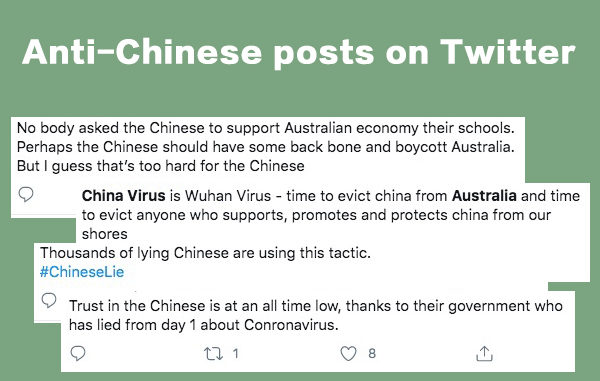
Source:Twitter
Meanwhile, the psychology of xenophobia and Sinophobia accelerates the racism against Asian, especially against Chinese.
Although the racist color-metaphor of Yellow Peril originated in the late 19th century, its vestiges still exist in the mind of some people after a century.
In the case of Coronavirus, there is a ubiquitous belief that the Chinese government concealed the essential information of Coronavirus intentionally, and caused the high threat in the worldwide.
Therefore, some activists and “bigots” believe that it is reasonable to blame and hate Chinese, even for a joke.
the amount that racism against asians is normalized in society is so fucked up and you can see it with the xenophobic mess that are coronavirus jokes. the deaths of individuals is not a laughing matter, and your blatant racism isn’t funny either.
— maia (@mxmtoon) January 29, 2020
It reminds me of Australian Attorney-General George Brandis spoke for “the right to be bigots” in 2014.
The speech defended the government plan to repeal the charge about “publicly offend, insult, humiliate or intimidate” a people or a community in the Racial Discrimination Act.
“People do have a right to be bigots. In a free country people do have rights to say things that other people find offensive or insulting or bigoted.”
–George Brandis
It seems like a dilemma, when the freedom of speech violates another political correctness, namely anti-racism.
However, the things you have the rights to do, are not equal to the things that are correct. In no cases would racism be correct, even with the “excuse” of Coronavirus.
Asians hate Asians
What makes Mera’s experience more ironic, is the identity of the racist she met. He is also an Asian.
Ironically but truly, the racism among different Asian groups or individuals does exist. Asians sometimes also hate Asians.
In some situations, the discrimination is caused by the regional bias and political hatred. Many accounts on Twitter have released anti-Chinese posts written in Chinese against people from the mainland of China, mainly due to the hatred to the Chinese political party.
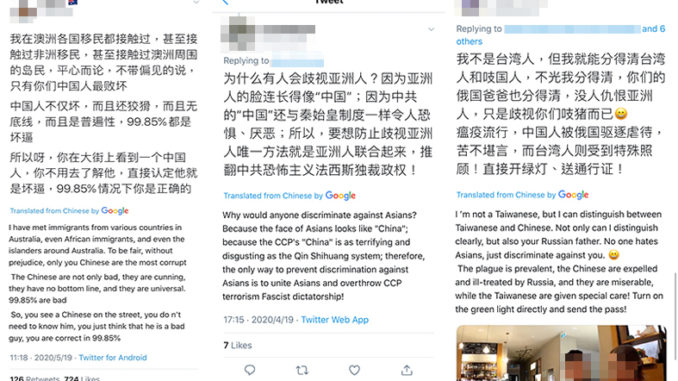
In other cases, the problem is more about the self-identify. Some Asians would feel ashamed for their race, as a result of long-term reception of racist information.
The former Democratic candidate for the President of the United States Andrew Yang acknowledged that he felt “self-conscious, even a bit ashamed, of being Asian” when being discriminated after the “Chinese Virus became a thing”.
Although he repeatedly claimed that do not discriminate Asians, his shameful feeling reflects the inner stereotype and inferiority complex for own race on the contrary.
“The lack of fair information and effective communication may be the reasons.
“No matter what the reason is, who they are, racism is unacceptable,” Mera said.
Efforts to anti-Racism
Up to today, a great effort has been paid by individuals, organizations and the government in Australia, to eliminate the anti-Asian racism.
The #UnityOverFear petition against Coronavirus-fueled racism offenses has been launched by Chinese Australian Forum and Asian-Australian influencers on April. More than 50,000 people have signed in one month.
The Australian Human Rights Commission released a statement on February, urging for unity and support, against racism in the Coronavirus crisis.
Later on April, the Prime Minister of Australia Scott Morrison also condemned the anti-Asian attacks in Australia in a video interview.
Within or beyond the context of pandemic, like Mera said, racism can never be rationalized by anyone, in any place or circumstance.




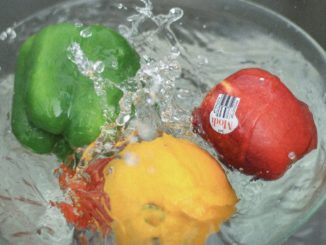
Be the first to comment